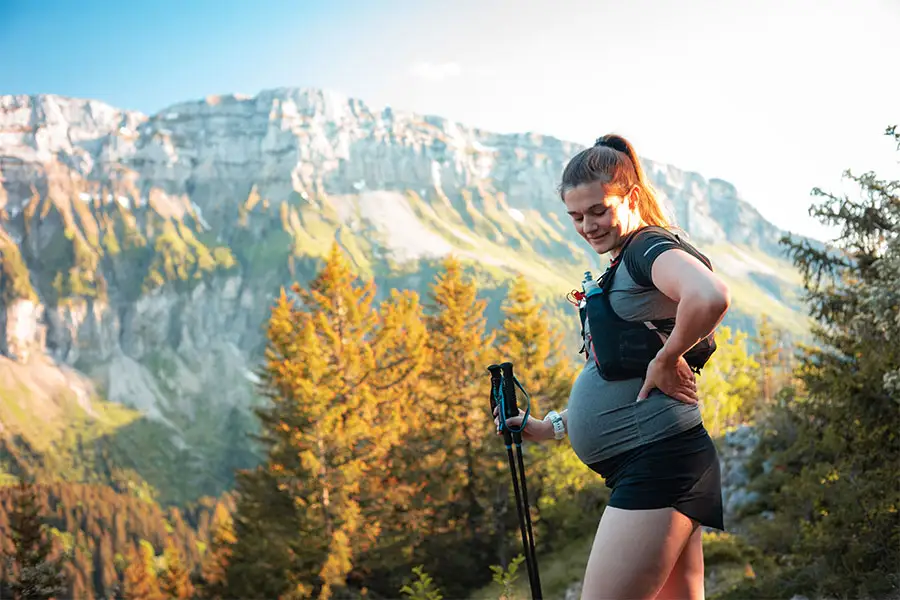Tips From a Flight Attendant: How to Fly While Pregnant and Nursing
Becky Hart | Sep 13, 2023

Bringing new life into the world can be a beautiful thing. It can feel anything but beautiful, however, when you’re flying while pregnant. If you have any concerns about your health or that of your baby when you fly, talk to your doctor. For hacks on how to be more comfortable and less stressed when you’re crammed in those narrow seats, Seven Corners went to the best expert we could think of: a pregnant flight attendant.
Meet our expert. Victoria is mom to two-year-old Maddy. She continued to work as a flight attendant for a major U.S. airline while pregnant (and, later, while pumping) and when we talked to her, was in her second trimester with baby number two.

Tips for Flying While Pregnant
Every mom is different. It’s important to listen to the advice from your doctor and what your body is telling you. There are actually very few rules from the airlines for flying while pregnant. For example, you can sit in the emergency exit row as long as you are “willing and able,” although those seats tend to be bit narrower, so just how willing you are could be a dealbreaker.
In terms of ease of air travel with a bun in the oven, here are Victoria’s top tips.
Time it right
When you’re flying with kids, you might want to choose flights based on when your child is most likely to sleep. But if it’s just you, flight attendant Victoria suggests not taking the first flight of the day, especially if you still have bouts of morning sickness.
"I don’t know if this is an across-the-board kind of thing, but I found it was better for me to travel in the middle of the day when pregnant," she said. “Just more people feel sick in the morning."
And flying when you already feel ill, in Victoria’s words, is “just not great.”
Pack snacks
Whether you’re hungry all the time or have odd pregnancy cravings (and turn-offs), having your own stash of snacks can be a real lifesaver. Airport food is expensive, and you can’t always guarantee your options will be healthy or sound appetizing.
“Pack all the snacks for yourself because just like a child, you’re also going to be ravenously hungry at all times and you don’t want to rely on airplane snacks,” said Victoria. “Even if you think your layover is long enough and you’re going to have time to grab food, you might be delayed and then you don’t have that. So bring lots of snacks and get lots of beverages because you just never know what your scenario is going to be like.”
There is one upside to eating on a plane, according to Victoria. “You have basically an unlimited supply of ginger ale if you’re feeling sick, which is the perfect drink for any kind of queasiness.”
Bring compressions sleeves
It doesn’t take a genius to realize that you expand when you’re pregnant. Being at altitude can intensify swelling. At worst, it could be unhealthy. At best, it’s just supremely uncomfortable.
“I found later on that calf compression sleeves were very helpful for my legs while pregnant because you already get swollen when you’re on a plane in general. Then when you’re pregnant, you’re even more swollen. So that helped me a lot to not feel like a total sausage and just be completely uncomfortable.”
Choose an aisle seat
Some people have very strong feelings about whether the aisle or the window is the best seat on a plane. Even if you love a window seat, as a pregnant person, opt for the aisle. First, you’ll have more room.
“This is me not being a flight attendant right now: spread out in the aisle. Because as a flight attendant I would tell you don’t do that. Just be aware of your body when people are in the aisle. I like having the aisle. At this point, I’m six months along. It’s kind of uncomfortable, so it’s nice to have a little extra wiggle room to shift around.”
Second, an aisle seat lets you move about the cabin more easily without bumping (pun 100% intended) your neighbors.
“Whether you’re early on in pregnancy and you’re having morning sickness, or it’s later on in pregnancy and you have to pee every three seconds, it will just make your life easier. And it’s very nice to just get up and not be like, ‘Excuse me, excuse me. I have to pee again.’”
Ask for help
When we talked to Victoria about flying with kids, she made a big point about not feeling guilty asking for help.
"If you look pregnant, people will help you, hands down. When I have either worked or traveled while pregnant, everyone is so kind. I’ve had people offer to put my bags away all the time, offer to let me cut in front of them in line," said Victoria. “Don’t feel like you’re going to inconvenience people because people in general are pretty nice.
“When you’re in the air, don’t be afraid to ask for more snacks and drinks if you want them and that helps you, your kids, with pregnancy, whatever. In general, we have extras of everything. Get yourself another 7-Up. Get yourself some
more pretzels. Remember that the flight attendants are there to help you. That is literally our job, so you’re not inconveniencing us by asking us to do our job.”

Tips for Breastfeeding While Flying
The biggest questions about flying postpartum probably all deal with nursing. Can you breastfeed on a plane? Does the airport terminal have mothers’ rooms? If I’m pumping, what are the rules for bringing bottled breast milk on a plane?
Follow TSA guidelines
Anything you pack related to nursing and pumping is considered medical in nature as far as TSA is concerned. Airlines know that this equipment and the resulting milk is necessary for your baby. Not only can you take these items through security checkpoints, but your bag with breastfeeding supplies counts as a medical bag and, as such, does not count toward your carry-on limit.
There is also not a specified amount of breast milk or formula you can take through security. According to the TSA website for traveling with children, “Formula, breast milk and juice for infants or toddlers are permitted in reasonable quantities through the security checkpoint.” What is “reasonable” leaves the issue open to interpretation, but Victoria doesn’t see this as a reason for concern.
"I have never had a TSA person comment on any amount of milk that I was bringing through. For the most part, especially if you’re pumping, people are like, ‘Don’t want to mess with that. I trust you.’ You just need to tell them that you have breast milk, or that you have formula, or that you have water for your kid, so they know before it goes through there. They’ll swab it, but they really don’t care about the quantity.
“They understand,” she said. “People go on a business trip, they pump, they bring back all the milk. It’s totally normal. And it can be liquid, it can be frozen, it doesn’t matter.”
Invest in a travel system
If you already have a breast pumping setup at home, you know there are a lot of bits and pieces. You certainly don’t want to travel with all that equipment, regardless of whether it counts against your carry-on limit. Fortunately, there are companies like Kiinde that design systems specifically for travel.
"It basically is a system that allows you to pump directly into the bag. You just screw the bags on (to the pump). You’re not pouring milk into bags, you’re not doing chemistry over here. You’re just pumping, and you’re done. That was really simple for me. It makes it so you bring less extra stuff."
Find the best lactation spaces
Where can you breastfeed your baby in an airport? Technically anywhere. Bathrooms are probably your worst option due to cleanliness. An airport without a lactation space is the exception rather than the rule these days.
"It doesn’t matter if you’re nursing or pumping, if there’s milk coming out of your body and you want a private place, there’s a place,” said Victoria. “Some airport websites have them (listed), but I have found the best way to find them is an app called MamaVa. They sponsor nursing pods, but even in airports that don’t have nursing pods, or in non-airports, you can put in a location, and they’ll tell you all the lactation spaces that are around there. And then kind of like Yelp, they might have a picture. They might say what’s in it. Does it have a sink, does it have a chair, what kind of situation is there? That’s kind of helpful so you know what you’re getting into and know what your options are."
All that being said, maybe you aren’t picky about being private. Or maybe you don’t have time to find a lactation room before boarding. There’s no need to worry.
“I have pumped in the middle of the terminal. I’ve pumped in the seat on the plane as a passenger. I wouldn’t do it in the bathroom because bathrooms are gross. But basically, nobody’s paying attention to what you’re doing. There’s so much going on that nobody cares,” Victoria said. “I’ve always just covered myself in case someone looked and me was like, ‘Oh, that’s weird.’ Nobody has ever said anything to me, no one has ever noticed anything. I had milk spill all over myself one time when I didn’t screw everything on right. No one noticed. No one cared.
“Pumping on a plane is also great if you can. Usually what I would do is I would go to the lavatory, put my nursing bra on if I wasn’t already wearing one, but then I would pump in my seat. Planes are loud, so the loudness of the plane covers up the noise of the pump. Again, nobody has ever noticed anything.”
And if you’re on a long flight? Or when Baby is just hungry, as in “Feed me RIGHT NOW”?
“Nurse your baby on the plane if you want to. You are allowed to nurse wherever you want, whenever you want. You are feeding your child. You don’t need to be ashamed of it,” said Victoria, clearly feeling very strongly about her — and your — right to take care of your baby. “You don’t have to put on a cover if you don’t want to. It’s totally up to you. The first couple times it might be weird, but it’s good to rip that Band-Aid off and be like, ‘I have to feed my baby. This is what is practical to my life. I don’t care about what other people think.’”
How to Protect Your Growing Family While Traveling
Before you book any flight, consider purchasing travel insurance. Protect the money you spent for your trip and get 24/7 travel assistance as part of the non-insurance benefits provided in your plan. Contact Seven Corners to find the right coverage for you and your entire family.
Search Posts
Receive our monthly inspiration and travel tips from the travel insurance experts.
Sign me upThis website and various social media updates provided by Seven Corners contain content, information, articles, videos, and links to websites created by third parties. Seven Corners, its owners, and its employees neither endorse nor are responsible for the accuracy, timeliness, or reliability of any third-party information, statements, opinions, or advice and are not liable for any loss, harm, or damage caused by your reliance upon them. Use of such information or the linked websites is entirely at your risk. Concerns regarding this third-party content should be directed to the third party. Seek professional advice, as appropriate, regarding your use of such information and websites.
Because the information on this website and in Seven Corners’ blogs and other social media is written and compiled using knowledge and information available at a certain point in time, it may become outdated. For that reason, information, events, legal requirements, and product changes (including benefits, limitations, exclusions, and services) may not be up-to-date, complete, or accurate at the point in time it is being read. Again, use of such information is at your risk.
